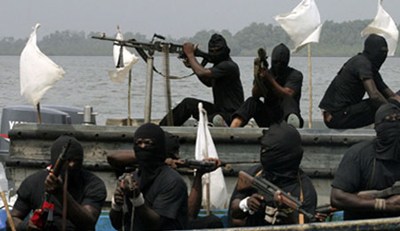
On Saturday, experts at a conference hosted by Nigeria’s Institute of International Studies asserted that the piracy problem in the Gulf of Guinea begins closer to the shore than in most other regions.
The oil laden delta-region on the southern coast of Nigeria is home to much insurgent activity, including hijacking oil pipelines and tankers, and selling it on the black market for significant profit. Groups of insurgents have become increasingly violent in recent years, and now freely steal oil from the pipelines along the coast and oil rigs just off-shore.
But the groups also target ships in the area, which has made international insurers Lloyd’s of London, rate the waters in the Gulf of Guinea just as dangerous as those infamous for piracy off the coast of Somalia. Cargo shipments have decreased across the entire region due to higher insurance rates and risk to cargo and human life. Many companies aren’t even reporting attacks for fear of their premiums rising. Private security firms are fast becoming the only option to safely conduct business in the region, where shipping has dropped 70% in some areas.
Threats in the region range from low-level thefts to full-fledged hijackings and kidnappings. Pirates have likely made millions stealing thousands of tons of oil. And now western governments are giving the problem more attention, partly because of the aforementioned damage to the economy of the region, but also out of concern for where the pirate’s money is going: Many of the insurgents are represent a radical brand of Islam and may be forging ties to al-Qaeda affiliates elsewhere in Africa.
The Nigerian government isn’t helping the issue. Since 2006, there has been an increased military presence in the delta region, but attacks have actually increased. Many have raised suspicions that at the very least, the government is complicit with the theft, and at the very worst, some high-level officials may be involved.
Although western nations have provided limited military aid to combat the issue, Nigerians have thus far adamantly protected their sovereignty and refuse to yield as much control to foreign nations as has been the case in Somalia.
For this reason, many companies are expected to turn to private security firms to protect their cargo, but this is simply addressing a symptom, not the cause of the infestation. While private security firms excel at deterring pirates, only cooperative efforts from a coalition of countries will be able to eradicate the complex networks of pirates. To do that though, the host government has to be less reluctant to cooperate. It remains to be seen how far the Nigerian government will come in that arena.